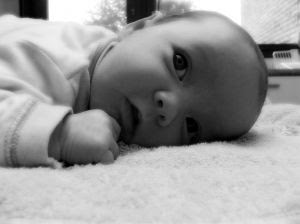Nancy, 41, mother of three
 I am a full-time at home mom. My children are eight, five and one year old.
I am a full-time at home mom. My children are eight, five and one year old.
I worked 100 per cent in an office job up until my first child’s birth and I’ve been an at-home Mom, general manager of this house since then. We have a big house and garden and kids, my plate is full. We’re lucky here that my husband works full-time and with his income we can afford me being at home.
As soon as my first daughter was here I thought this is natural and normal for me, I thought this is fine with me. Before I was in two minds, I thought I didn’t want anybody telling me I had to work part-time and at the same time I didn’t want to be forced to go back to work full-time. I just wasn’t sure.
Within the first week or two I knew that I was going to enjoy this and my husband left the decision to me. He’s glad that I’m at home as he’d rather have me looking after the kids than somebody we don't know.
Maybe when my youngest goes to kindergarten I’d like to go to work but if it doesn’t happen it doesn’t happen. I take it one year at a time and I don’t think I’m missing out on anything.
Eight years ago it was more of a surprise to people, especially women, that I wasn’t going back to work. Women my age and older expect you to go back to work and to want to go back, to not be satisfied.
Read more
Photo credit: semlibeer
TODAY'S BOOK SUGGESTION:
 Infertility Survival Handbook
Infertility Survival Handbookby Elizabeth Swire-Falker
-- After seven years of tests and more tests, treatments and more treatments, Elizabeth Swire-Falker understands what it means to struggle with infertility.
In this frank, reassuring, and thoroughly researched handbook, she shares her own personal experience and offers insight into what challenges to expect along the way-from getting support to finding the right doctor to dealing with insurance.
She gave up her career in the process when she found she couldn't struggle with infertility and maintain a high-powered job at the same time.
The years were filled with injections and blood tests and hormones and in vitro fertilizations, implantations, and miscarriages, and return trips to the assisted reproductive technology lab.
Click to order/for more info: Infertility Survival Handbook
Don't have a Kindle? Get your Kindle here, or download a FREE Kindle Reading App.










0 comments